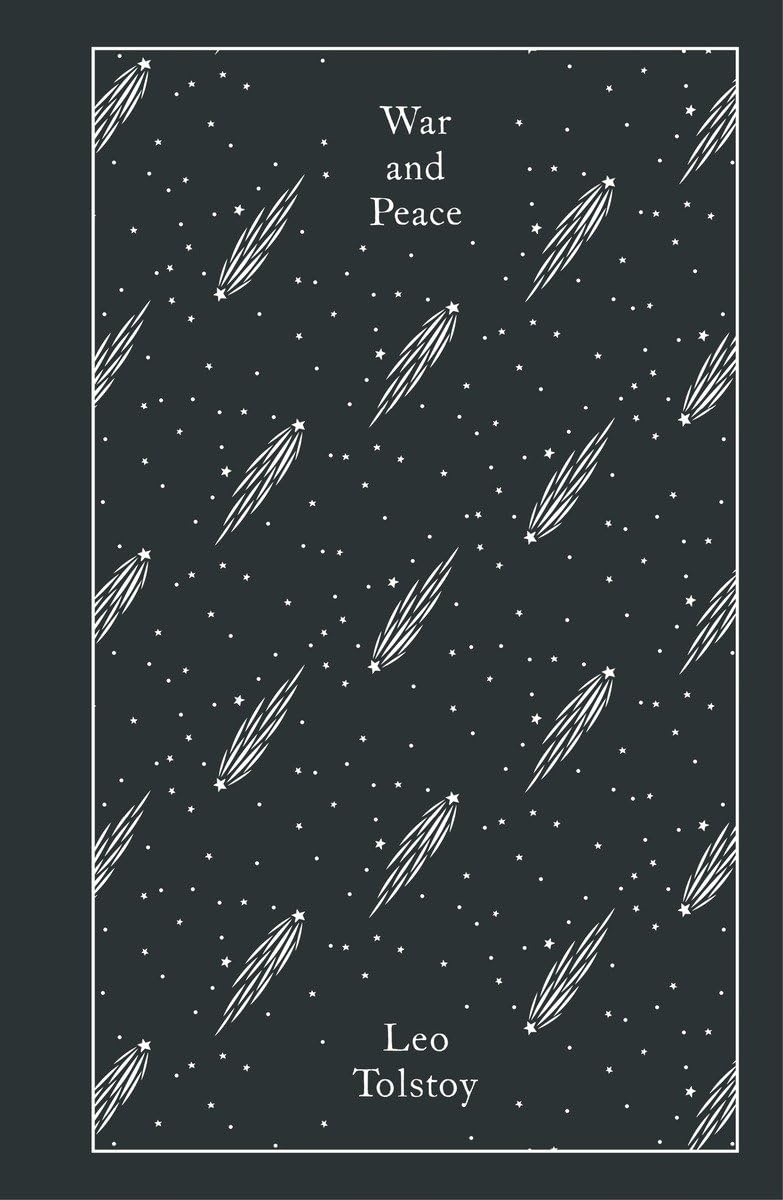War and Peace

Author: Tolstoy, Leo
Tags: romance, history, edifying
Timeline: between Thursday, May 2, 2024 and Sunday, March 2, 2025
Whew spent the better chunk of a year with this sitting incomplete and now its done: what can I say about this that hasn’t been said by literally thousands of people?
A story with so many characters ultimately only follows the two couples: Pierre with Natasha and Nicholas Rostov with Mary Bolkonskaya. I thought Andrei would make it through but no, Tolstoy teases us with his death early on and then later he seems to die again only to linger on for several chapters. And ultimately the through line of the book is Pierre who in spite of his education and privilege has to learn everything the hard way, and who has no real self discipline or strong emotional foundation with which he can translate his good intentions into good outcomes. As in the first glimpse of him having promised Andrei he will stop drinking, go home and to bed, but then justifies his decision to spend the rest of the night drinking at Dolokhov’s raucous party. And for much of the book we conveniently have the grounded and competent Andrei to illustrate this through the contrast, in particular we see this in how they manage their serfs.
I find it fascinating how Tolstoy chooses what makes it into the tight focus narrative sections within a story that spans eight years, two armies and dozens of characters. For example we don’t just get Anatole discussing his desire to elope with Natasha followed by a scene where he is stopped from entering the house, we get a whole set of chapters where he and Dolokhov discuss it (Dolokhov is mildly discouraging), plan it, gather the supplies, choose the clothing to wear, argue with their henchmen, then we are along on the sleigh ride through Moscow wreaking havoc on other city travelers and property. It reminds me of the present-stealing scenes in the Grinch. So much detail about one, granted, important, episode but the real significance of the episode is Natasha’s undeniable betrayal of Andrei, we don’t need a blow by blow account of the attempted abduction. Another similarly unnecessary volume of detail covering Nicholas’ hunting trip followed by the narrative of the Christmas festivities, seemingly this is all just to lead up to Nicholas’ (almost official) proposal to Sonya. Or the several chapters describing the pointless actions of Rostropchin (“Mayor” of Moscow) leading up to the occupation of Moscow by the French and especially his cruelty throwing a political prisoner to the mob.
- Why could Tolstoy not give Helena Bezhukova some narrative around her death or for that matter her brother Anatole? I mean they both spend a great deal of time causing grief to Pierre, Mary and Natasha. As a reader I want some revenge.
- I would love an edition of the book that skips over all of Tolstoy’s narrative about history, troop movements (or at least clearly marks them out so the reader could self abridge).
Some of my favorite humorous scenes:
- Pierre, like Mr. Magoo, wandering through the death of his uncle, not understanding that all they black clad guys and their wagons are undertakers, not understanding the bitter struggle over the will (Pierre’s inheritance) taking place before his eyes.
- Natashas’ obnoxious demand for pudding at the party which she can get away with because she is Daddy’s favorite little princess.
- The chapter explaining how Helena justifies her desire to remarry (thus nullifying her marriage to Pierre) because “Pierre would want this for her” and because “these noblemen want her and she can’t stand to disappoint them” as if this is all perfectly normal (and the fact that she, can just brazen out this self serving behavior.)
Lastly, the following description of the oak tree which Andrei contemplates before meeting Natasha Rostov.
“At the edge of the road stood an oak. Probably ten times the age of the birches that formed the forest, it was ten times as thick and twice as tall as they. It was an enormous tree, its girth twice as great as a man could embrace, and evidently long ago some of its branches had been broken off and its bark scarred. With its huge ungainly limbs sprawling unsymmetrically, and its gnarled hands and fingers, it stood an aged, stern, and scornful monster among the smiling birch-trees. Only the dead-looking evergreen firs dotted about in the forest, and this oak, refused to yield to the charm of spring, or notice either the spring or the sunshine.”And the same oak after his visit to the Rostov home:
“Yes, here in this forest was that oak with which I agreed,’ thought Prince Andrei. ‘But where is it?’ he again wondered, gazing at the left side of the road, and without recognizing it he looked with admiration at the very oak he sought. The old oak, quite transfigured, spreading out a canopy of sappy dark-green foliage, stood rapt and slightly trembling in the rays of the evening sun. Neither gnarled fingers nor old scars nor old doubts and sorrows were any of them in evidence now.”Tolstoy's use of that tree as the indicator of Andrei's mental state is a memorable example in evidence of the writer's skill.